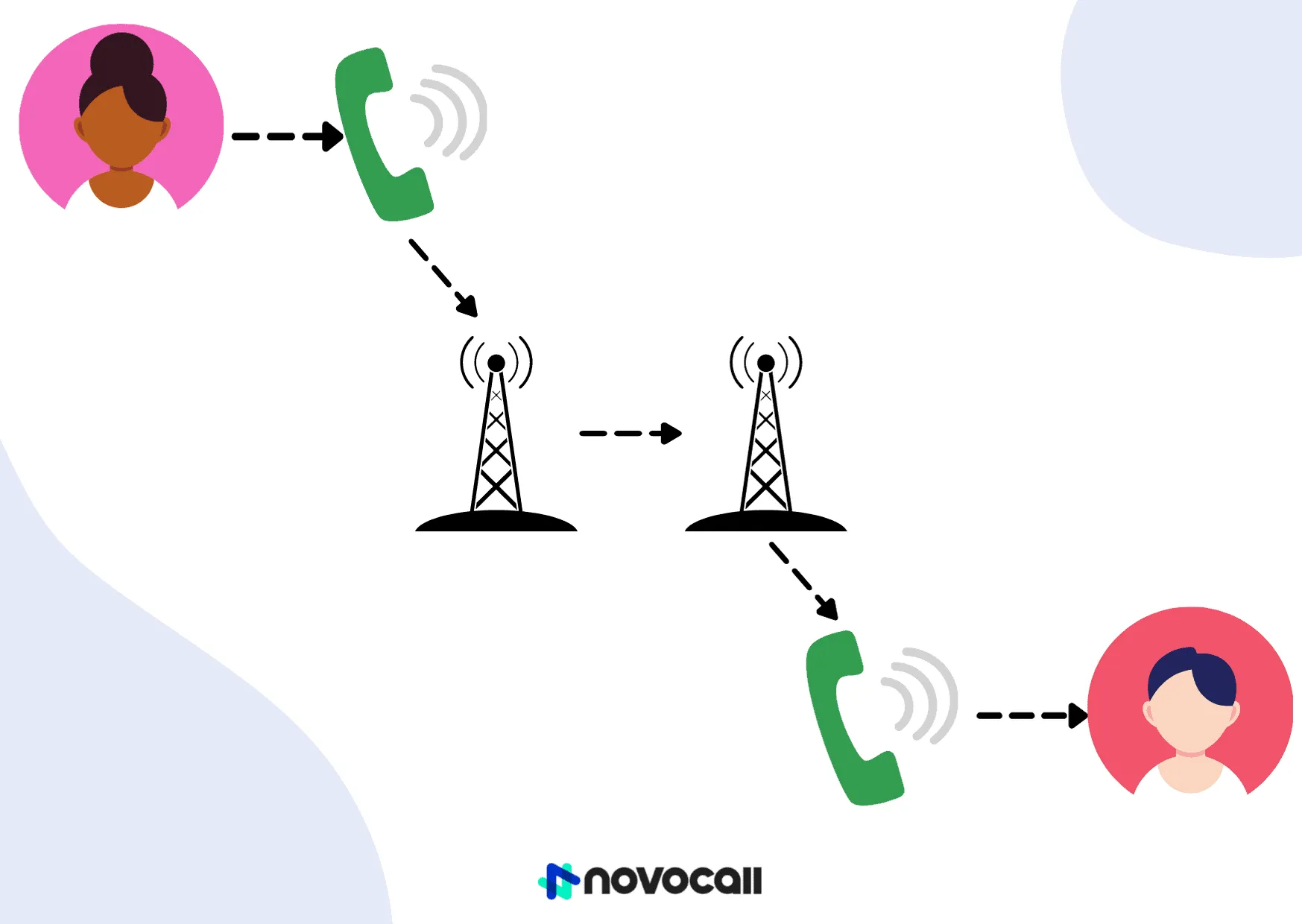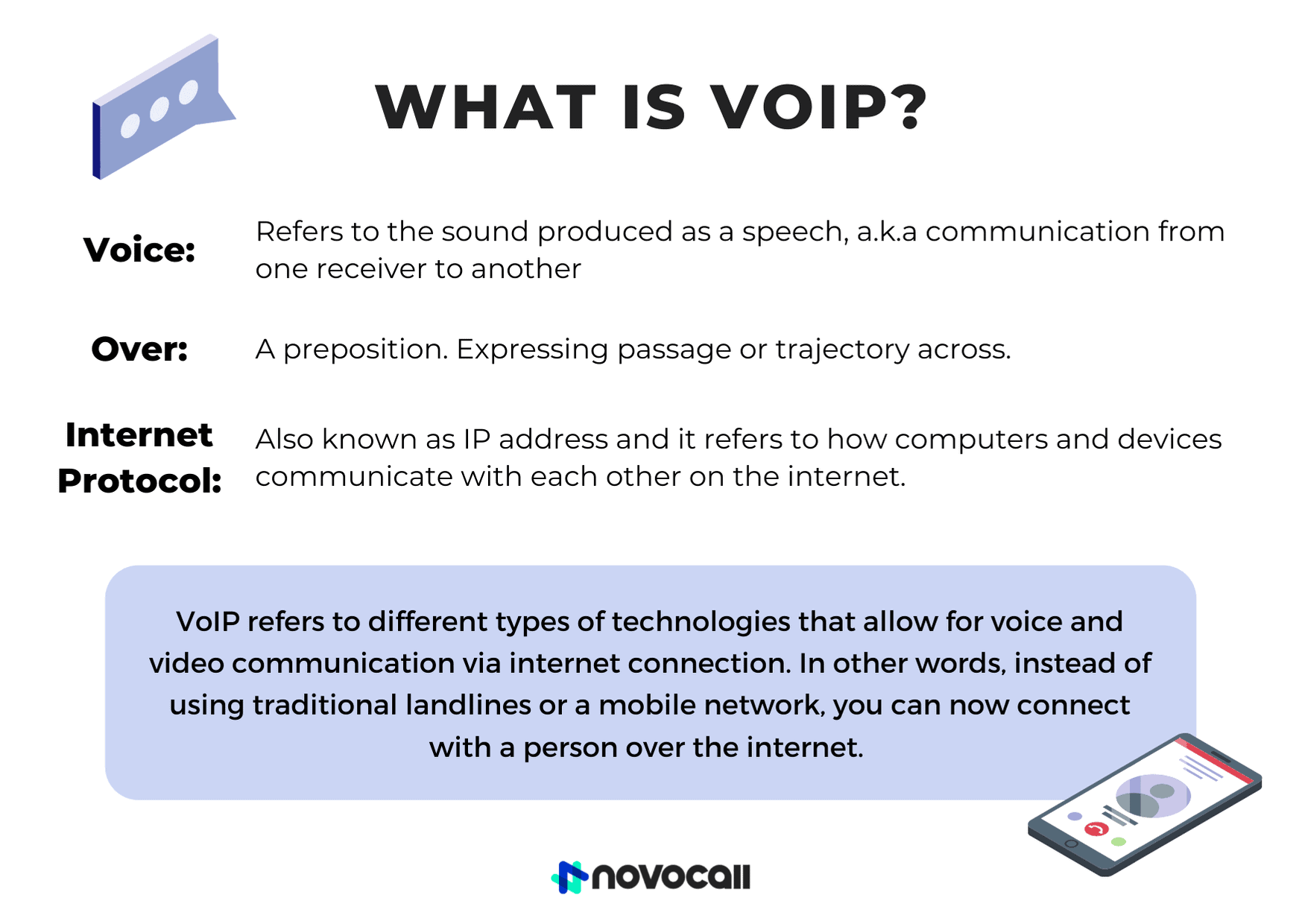

Start driving better conversations.
Novocall will be your new favorite business phone system.

Content Marketer

Are you still using a landline for business communication? Or are you part of the 61% of businesses switching from traditional phone lines to VoIP phone systems?
If not, Whatever the case may be, you’ve clicked on this article because you’re deciding between the two, and we’re here to help you make an informed decision on which phone system to get for your business.
Spoiler alert: VoIP phone systems are the superior choice. 😉
But what makes VoIP software such a convincing choice over landlines? Are there any exceptions where landlines are preferred?
Let’s dive deeper as we make a comparative analysis between the two!
A landline phone system is the technology where electrical signals are sent over copper wires so that your voice can be transmitted to the recipient.
These back and forth transmissions are what makes up phone conversations.

Businesses will often set up a Private Branch Exchange (PBX) system in their office to link up multiple phones to the phone network. Such a setup allows employees to make and receive calls via their desk phones.
VoIP refers to Voice over Internet Protocol technologies that allow for voice and video communication via internet connection.

With an internet connection, your business can use a VoIP software to make calls to reach your leads and customers, even on their regular landline. Essentially, it bypasses your need for a traditional landline when making calls and receiving calls.
Desk phones, mobile phones, and computers can all be used to make calls with VoIP software.
These traditional phone systems will require a local phone company to set up and install a physical PBX system within your office premises. They will need to connect the PBX system to the main phone system.
This internal network will then connect to your team’s desk phones via telephone cables, where a variety of features will need to be then manually set up. Some examples include setting up extension lines, caller ID, and quick dial.
We wrote a step-by-step guide on how to set up VoIP, but here are the broad steps involved.
After you’ve purchased your VoIP system, you’ll work with your VoIP software provider to port over your existing business number.
If you have any physical phones, it should be a straightforward link up to your internet router using an Ethernet cable.
On the software, you’ll create accounts for your team to access the software, verify connectivity by doing test calls, and activate your features to set up call flows.
🏆Who wins this round: No clear winner.
Installing and setting up landline phone systems seems less troublesome because your local phone company’s personnel will assist with the entire process, but their physical presence is required.
On the other hand, onboarding a VoIP phone system will mainly be done by you and your team. Though more effort is needed from your team, VoIP software supports decentralized teams who may not have a common workspace.
Landlines have remained over the past century because of their reliability. Call quality has mostly stayed at the consistent level that we’re all familiar with, and calls are rarely dropped.
Call quality for VoIP systems are largely dependent on your internet connectivity. Nextiva recommends 100kbps of bandwidth for every phone line connected, a latency of 150ms or less, and a jitter of 20ms or less.
Some VoIP systems have features to improve call quality as well. The ability to use a headset and adjust your audio settings gives your team greater control, and other features like background noise reduction can also improve the quality of your outgoing calls.
🏆Who wins this round: No clear winner.
With good internet connectivity, VoIP systems are just as reliable and consistent in call quality as landlines.
A landline phone system is restricted to a physical location. Phones are connected via phone cables and are deskbound.
Since calls are made over the internet with VoIP systems, you have the flexible option to choose to make calls via any device that connects to the internet. You can make and receive calls from the same phone number via your home desktop computer, your company laptop, tablet or mobile phone.
With that said, you have the added benefit of mobility with VoIP phone systems. Make calls from any part of the world, so long as you’re connected to the internet. Stay connected on-the-go, and never miss that important call ever again even if you’re out of office.

The familiar call management features from landline phone systems include the likes of call forwarding, call tracking (caller ID), and Interactive Voice Response (IVR) menus to attend to incoming calls.
Landline phone systems sufficiently provide basic call features needed for business. However, there’s so many more features to support business workflows.
Apart from the basic call management features mentioned above, VoIP systems offer advanced call management features, integrations, and other features to enhance your team’s workflows.
Advanced call management features include call recording, auto-attendants, and autodialers that can help to improve your team’s productivity.
Integrations with analytic and CRM tools enable your team to easily review their customer’s needs and their work.
Other premium features like group calling and video calling can further supplement your business needs, if required.
🏆Who wins this round: VoIP
Making calls via landline remains reasonably affordable, but every other aspect of landline phone systems can be quite expensive.
Setup costs for landlines can be a heavy investment, with purchase of equipment such as the PBX system, telephone adapters, routers, and phone sets.
Phone companies also charge for features in landline systems. Voicemail or caller ID features don’t come cheap, and are commonly charged on a monthly basis.
Calling rates for international calls over landlines are also infamously high. This makes landline phone systems especially expensive for companies with a global reach.
VoIP phone systems are usually charged on a subscription basis, where all features are already covered in the pricing plan selected. This helps business owners to reliably predict their monthly cost for their calling needs.
Since calls are made using computers and devices, no extra installation cost is incurred, unless the business has special needs for VoIP systems to be linked up to physical phones.
VoIP calls are made over the internet. As such, international calling rates via VoIP systems are significantly lower than landlines.
🏆Who wins this round: VoIP
Landline phone systems are most reliable to make calls for emergency services. You rarely lose call connection with landline phones, and the physical connection of landline phone systems allow dispatchers to trace your location.
VoIP phone systems have improved and are able to make emergency calls nowadays. However, noting that you can easily lose power or internet connectivity during emergencies, VoIP systems are simply not ideal for emergencies.
🏆Who wins this round: Landline
Adding new users and phone lines will require physical installation with landline phone systems. This usually incurs a cost for your local phone company to send a technician to assist with these additions, and can be quite an inconvenience whenever you want to scale up your calling operations.
Adding new phone lines on your VoIP system is easy to purchase and implement. Simply click to purchase your virtual phone number and start using them.
VoIP phone systems are also designed to be scaled up — most VoIP providers have a variety of pricing plans that introduce more features to support more complex business communication needs when your business grows. This transition is commonly designed to be a smooth and hassle-free upgrade.
🏆Who wins this round: VoIP

We hope it’s obvious that VoIP phone systems are better for businesses. They are more affordable, provide greater flexibility, mobility and scalability, and support a range of features to boost your business’ calling needs.
But if your business resides in areas more prone to internet outages and where emergency calls are an absolute necessity, landline phone systems will be the preferred option for you.
If you’re looking to switch up your existing landline and adopt a VoIP phone system instead, consider Novocall!
Novocall is a business phone system that is especially suited for small and medium businesses in call-driven lead generation efforts, made possible with its features like click-to-call, an outbound dialer, and call tracking.
Easily scale up anytime with Novocall by purchasing phone numbers directly, and make calls to over 42 different countries at extremely low costs.
Get started with us today with our 14-day free trial to see what Novocall can do for your business!

Yong Qing is a Content Marketer at Novocall. In his own time, he enjoys making music and philosophical conversations.
Discover more
Subscribe to our blog
Get insights & actionable advice read by thousands of professionals every week.

